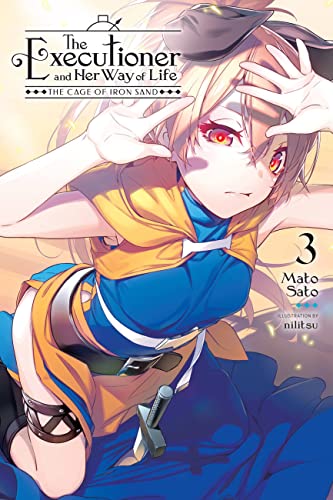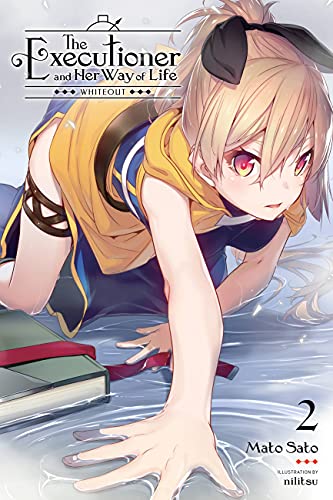By Mato Sato and nilitsu. Released in Japan as “Shokei Shoujo no Virgin Road” by GA Bunko. Released in North America by Yen On. Translated by Jenny McKeon.
For the most part this fourth volume of The Executioner and Her Way of Life is a bit of a breather volume. There’s pretty much zero gore, which is nice. Akari and Momo prove to be highly amusing together as they pettily snipe at each other, and both are more interesting away from Menou. And the running gag of various enemy agents being forced to admit they’re sex pests to avoid giving away their cover runs long enough to be funny and just that long. Plus we get the addition of several old villains, and they’re almost pleasant. All this and hot springs. The whole thing would be lovely if it were not for the fact that Akari is still a ticky ticky timebomb… or is she? As Menou slowly figures out… or is straight up told… various parts of the plot, she rapidly realizes that killing Akari to save the world might not be what’s actually going on. Unfortunately for her, her Master has come to take over.
Akari and Momo, reluctant allies – very reluctant – take a train to a nearby hot spring town in the mountains. Neither one wants to be around the other, but they both have one thing in common, which is that they want to save Menou’s life. Unfortunately for them, Menou managed to go after them much faster than expected due to the obvious solution of “ask Ashuna for money and a ride”. Good news for Ashuna (and the reader), this involves Menou dressing in a butler uniform. And, as it turns out, EVERYONE is arriving at this little mountain town, including Pandaemonium, who lacks power but is still dangerous, Manon, who is resurrected with a new body, and one other surprise guest. Things do not build to a furious climax, alas, but peter out, as Akari ends up spirited away by the one person whose presence has suffused this whole series.
The best parts of this book were the parts with Akari and Momo. Their constant insults and angry bitching is funny, yes, but as the book goes on we get to see how both of them are generally a lot kinder than they’d like to let on, and Akari in particular feels less upset by Momo’s attitude after she realizes that Menou is pretty much all Momo has. We also get a lot of stuff explained to us here, such as the nature of Conjurations, why Akari has to be killed, and what really happened in the past. This even ties in with Japoan, not only because the hot springs mountain town is the closest we’ve seen to Japanese culture in this world, but also because there may be a way to get Akari back after all. If she wants to go. And if she can put up with mass murder. And of course Flare, near the end of the book, shows us, unsurprisingly, that she’s not going to arrive to save the day.
This series has a cast that are interesting and fun to read about but are all, except maybe for Menou, various shades of unpleasant. It makes for an intriguing read.



